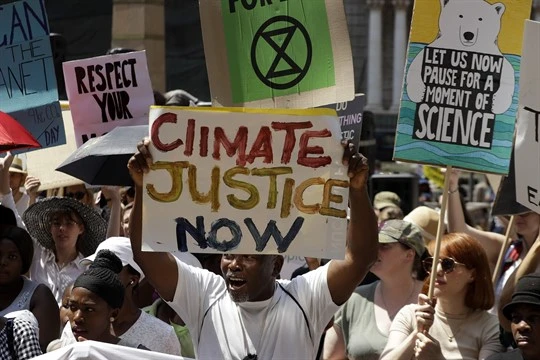A senior researcher of the Tax Justice Network, Rachel Etter-Phoya, has pointed out that all the money Africa desperately needs to fight climate change can be found in a global tax abuse system enabled by rich countries.
Referencing the 2021 report on Global Tax Justice, she explained that rich countries are behind $483billion loss of taxes to countries, mostly poor nations that are also incidentally hardest hit by climate change.
While Africa contributes less than 4% to carbon emissions, the US and EU contribute 25% and 22% respectively.
Yet African countries are not getting the help they need to address a climate problem they scarcely created.
A pledge by developed countries to contribute $100billion annually to help developing nations fight climate change has not been met.

World leaders ended the United Nations Conference of Parties on Climate Change (COP26) in Glasgow on November 12, 2021 with mixed feelings about progress on fighting climate change.
The Glasgow Climate Pact was announced afterwards to reiterate commitment to accelerate action on the climate crisis but the conference raised questions about Western commitment to helping African countries transition to sustainable development and green technology.
Reviewing the conference on the fifth episode of the African Climate Foundation’s (ACF) podcast series titled Africa Voices: Messages for the COP, Rachel Etter-Phoya said there are billions African countries can recover from tax abuses perpetrated by multinationals and enabled by wealthy nations.
To put the money in perspective, she said the $438bn lost to globe tax abuse is nearly five times the $100bn pledge for climate finance for developing countries.
Of the $483 billion lost a year, $312 billion of this tax loss is due to cross-border corporate tax abuse by multinational corporations and $171 billion is due to offshore tax abuse by wealthy individuals.
Rachel Etter-Phoya who has also worked as a Senior Revenue Specialist in Malawi’s Ministry of Natural Resources, Energy and Mining said fighting global tax abuse is, therefore, key to fighting for funds for climate change.
She said foreign aid to Africa is a pittance when compared to monies African economies lose to capital flight. She said $1.4trillion lost through capital flight from 40 African countries in the last 40 years “greatly exceeds” the debts they owe or the foreign aid they are given.
“Africa is a net creditor to the world,” she said, noting the continent loses more money than it receives from industrialised nations.
She said these industrialised nations make a chunk of global tax rules at the Organisation for Economic Co-operation and Development (OECD) which are unfavourable to African countries.
She noted that OECD, which is made up of former colonial and settler powers, does not have African countries as member states yet makes tax rules for the continent.
“No African country is a member of the OECD. The OECD did leave the door ajar a little bit to establish what they called an inclusive framework” she said but added that more than half the continent’s countries are not part of this framework.
“We don’t have a voice at OECD,” she bemoaned and said, “as African countries, we need to be pushing for the debate on tax to be moved to the UN.”



